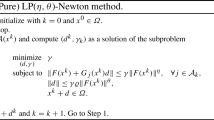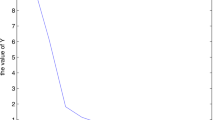Abstract.
For a class of semismooth operator equations a mesh independence result for generalized Newton methods is established. The main result states that the continuous and the discrete Newton process, when initialized properly, converge q-linearly with the same rate. The problem class considered in the paper includes MCP-function based reformulations of first order conditions of a class of control constrained optimal control problems for partial differential equations for which a numerical validation of the theoretical results is given.
Similar content being viewed by others
References
Allgower, E.L., Böhmer, K., Potra, F.A., Rheinboldt, W.C.: A mesh-independence principle for operator equations and their discretizations. SIAM J. Numer. Anal. 23 (1), 160–169 (1986)
Alt, W.: Discretization and mesh-independence of Newton’s method for generalized equations. In: A. Fiacco (ed.), Mathematical programming with data perturbations. Dekker, New York, 1998, pp. 1–30
Arada, N., Casas, E., Tröltzsch, F.: Error estimates for the numerical approximation of a semilinear elliptic control problem. Comp. Optim. Appl. 23 (2), 201–229 (2002)
Argyros, I.K.: A mesh-independence principle for nonlinear operator equations and their discretizations under mild differentiability conditions. Computing 45 (3), 265–268 (1990)
Argyros, I.K.: The asymptotic mesh independence principle for Newton-Galerkin methods using weak hypotheses on the Fréchet derivatives. Math. Sci. Res. Hot-Line 4 (11), 51–58 (2000)
Chen, X., Nashed, Z., Qi, L.: Convergence of Newton’s method for singular smooth and nonsmooth equations using adaptive outer inverses. SIAM J. Optim. 7 (2), 445–462 (1997)
Chen, X., Nashed, Z., Qi, L.: Smoothing methods and semismooth methods for nondifferentiable operator equations. SIAM J. Numer. Anal. 38 (4), 1200–1216 (2000)
De Figueiredo, D.G.: Lectures on the Ekeland Variational Principle with applications and detours. Springer Verlag, Berlin, 1989.
Deuflhard, P., Potra, F.A.: Asymptotic mesh independence of Newton-Galerkin methods via a refined Mysovskii theorem. SIAM J. Numer. Anal. 29 (5), 1395–1412 (1992)
Dontchev, A.L., Hager, W.W., Veliov, V.M.: Uniform convergence and mesh independence of Newton’s method for discretized variational problems. SIAM J. Control Optim. 39 (3), 961–980 (2000)
Facchinei, F., Fischer, A., Kanzow, C., Peng, J.-M.: A simply constrained optimization reformulation of KKT systems arising from variational inequalities. Appl. Math. Optim. 40 (1), 19–37 (1999)
Falk, R.: Approximation of a class of optimal control problems with order of convergence estimates. J. Math. Anal. Appl. 44, 28–44 (1973)
Hintermüller, M., Ito, K., Kunisch, K.: The primal-dual active set strategy as a semi-smooth Newton method. SIAM J. Optim. 13 (3), 865–888 (2003)
Kelley, C.T., Sachs, E.W.: Mesh independence of the gradient projection method for optimal control problems. SIAM J. Control Optim. 30 (2), 477–493 (1992)
Kummer, B.: Newton’s method for nondifferentiable functions. In: J. Guddat, B. Bank, H. Hollatz, P. Kall, D. Klatte, B. Kummer, K. Lommatzsch, K. Tammer, M. Vlach, K. Zimmermann (eds.), Advances in Mathematical Optimization, Akademie-Verlag, Berlin, 1988, pp. 114–125
Kummer, B.: Generalized Newton and NCP-methods: convergence, regularity, actions. Discuss. Math. Differ. Incl. Control Optim. 20 (2), 209–244 (2000)
Ortega, J.M., Rheinboldt, W.C.: Iterative solution of nonlinear equations in several variables. Society for Industrial and Applied Mathematics (SIAM), Philadelphia, PA, 2000. Reprint of the 1970 original
Qi, L.: Convergence analysis of some algorithms for solving nonsmooth equations. Math. Oper. Res. 18 (1), 227–244 (1993)
Qi, L., Sun, J.: A nonsmooth version of Newton’s method. Math. Program. 58 (3), 353–367 (1993)
Robinson, S.M.: Newton’s method for a class of nonsmooth functions. Set-Valued Anal. 2 (1-2), 291–305 (1994), Set convergence in nonlinear analysis and optimization
Ulbrich, M.: Nonsmooth Newton-like Methods for Variational Inequalities and Constrained Optimization Problems in Function Spaces. Habilitationsschrift, Zentrum Mathematik, Technische Universität München, München, Germany, 2001
Ulbrich, M.: On a nonsmooth Newton method for nonlinear complementarity problems in function space with applications to optimal control. In: M.C. Ferris, O.L. Mangasarian, J.-S. Pang (eds.), Complementarity: Applications, algorithms and extensions (Madison, WI, 1999), Kluwer Acad. Publ., Dordrecht, 2001, pp. 341–360
Ulbrich, M.: Semismooth Newton methods for operator equations in function spaces. SIAM J. Optim. 13 (3), 805–842 (2003)
Ulbrich, M., Ulbrich, S.: Superlinear convergence of affine-scaling interior-point Newton methods for infinite-dimensional nonlinear problems with pointwise bounds. SIAM J. Contr. Optim. 38 (6), 1938–1984 (2000)
Volkwein, S.: Mesh-independence for an augmented Lagrangian-SQP method in Hilbert spaces. SIAM J. Contr. Optim. 38 (3), 767–785 (2000)
Zeidler, E.: Nonlinear Functional Analysis and its Applications II/B. Springer Verlag, Berlin, 1990
Author information
Authors and Affiliations
Corresponding author
Additional information
Mathematics Subject Classification (1991):65J15, 65K10, 49M25, 90C33
Accepted: April 19, 2004
Rights and permissions
About this article
Cite this article
Hintermüller, M., Ulbrich, M. A mesh-independence result for semismooth Newton methods. Math. Program., Ser. A 101, 151–184 (2004). https://doi.org/10.1007/s10107-004-0540-9
Received:
Published:
Issue Date:
DOI: https://doi.org/10.1007/s10107-004-0540-9




